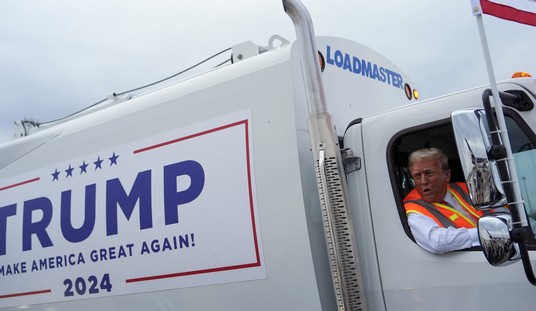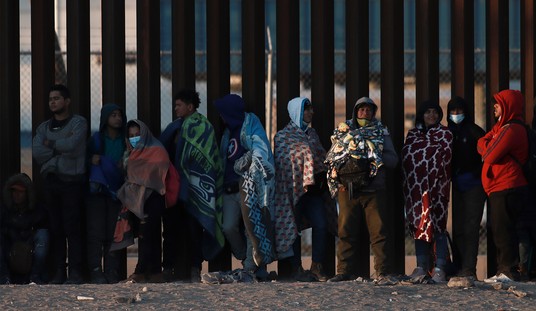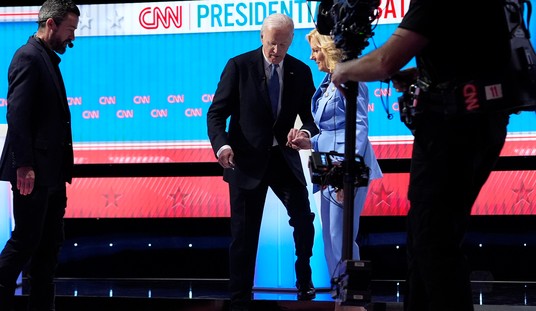This is pretty lame even by MSNBC’s standards, but it’s only a somewhat lamer version of the tongue-clucking that has taken place in much of the media since the shooting in Garland. Chris Matthews froths at the mouth over what he calls a deliberate provocation of Muslims by Pamela Geller, Robert Spencer, and Geert Wilders. His guest, Evan Kohlmann, then tosses out a completely ignorant argument that applies the “shouting fire in a crowded theater” standard where it’s not at all applicable, all in an attempt to blame the intended victims for an act of terrorism.
In other words, it’s all in a night’s work for MSNBC (via The Right Scoop):
https://www.youtube.com/watch?v=JQYrwvUHvN4
MATTHEWS: This is problematic to me, because I wonder whether this group that held this event down there to basically disparage and make fun of the prophet Mohammed doesn’t in some way cause these events. Well, not the word “causing” — how about provoking, how about taunting, how about daring? How do you see the causality factor here?
KOHLMANN: Look, I don’t want to be insulting freedom of speech. Everyone has the right to freedom of speech, and it’s good to stand by that principle. But these people are not standing by that principle. They’re standing by the principle of hatred of other people. That’s their guiding light, that’s what they do. They’re intentionally trying to provoke a response from the Muslim community, and unfortunately this was predictable. You know that because the police told them in order to hold this event, they would have to have $10,000 worth of security on hand. They had a SWAT team outfitted like it was Baghdad.
So obviously someone knew that there was a likelihood that some stupid person would do this. And again, I don’t think it’s any great revelation that if you shout fire in a crowded theater, and you incite people, and you say nasty invective about people’s ancestors and their religious symbols, that there are a couple of crazy nutcases that are going to come out of the woodwork and are going to try to take action over it. But that has nothing to do with Islam. There are Christians, there are Jews, there are plenty of other people from other faiths who’ve done the exact same thing.
Frankly, this is as far as I could go, with the sheer ignorance of these arguments finally forcing me to stop. Let’s point out of a few of them here:
- Contra Matthews, “provoking” is the same as “causing,” and “daring” is just as bad. The “causality factor” is blaming the victim for the violence for simply conducting speech.
- Perhaps Kohlmann can point us to the myriad examples of Christians and Jews massacring people for drawing cartoons and venting criticism and opposition to the dominant Judeo-Christian culture in the era where freedom of speech was effectively enforced. We’ve seen all sorts of examples of it from Islamists, despite Kohlmann’s declaration that it “has nothing to do with Islam.” If that’s the case, then why does Kohlmann also argue that “unfortunately this was predictable”? Predictable on what basis?
- Free speech does mean one can “say nasty invective about people’s ancestors and their religious symbols,” whether one likes it or not.
- Holding a rally is not anywhere near the “shouting fire in a crowded theater” exception to protected free speech. In fact, it has no relation to it at all. That exception, carved out in Schenck, holds that one cannot claim First Amendment protection for false speech that causes an imminent panic in a crowd. The danger from false speech has to be both “clear and present,” limited later in Brandenburg to only the most “imminent” of conditions — false speech intended to cause a riot or stampede. It doesn’t apply at all to opinions.
- What Kohlmann is actually proposing is the “heckler’s veto” that would shut down rallies and demonstrations as soon as opposition forces realize they can leverage violence to silence them. That, by the way, is exactly what Islamists want — a carve-out that prevents any criticism of Islam, enforced by governments eventually, but by violence first.
- Most public rallies require some sort of security. Ten thousand dollars doesn’t get you “outfitted like Baghdad,” either. Besides, as it turns out, the security was necessary, no?
Ed Driscoll notes that Matthews sung a different tune after the Charlie Hebdo massacre:
There is a history of retaliation for perceived slights to Islam. Back in 1989, a fatwa, or death sentence, was issued for Salman Rushdie because his book Satanic Verses was considered offensive to Islam. In 2004, we all know this story, dutch filmmaker Theo van Gogh was murdered on the street by a killer who considered van Gogh’s work anti-Islamic. In 2005, when a Dutch newspaper published cartoons lampooning Muhammad, the artists and publishers were met with death threats.
I want your view because you’re so optimistic on this. What do you make of what happened today? Do you think it is an odd occurrence? Or is this the start of something that we’re going to have to live with for decades? Where people — this whole thing being disaffected. Tough luck you’re disaffected. You’re living in France. The country is called France. It’s French. Liberty, equality, fraternity. Get with it. If you don’t like living there, move! This idea that somehow France has to adjust to your thinking about what constitutes blasphemy is outrageous.
It’s been amazing to watch the media twist itself into pretzels in order to attack Pamela Geller, Robert Spencer, and the 300 or so people who turned out to participate in the event. With some notable exceptions, it’s vastly different than the media’s reaction to the Charlie Hebdo massacre, with many making the issue of taste somehow more important than an attack on a peaceful demonstration against the very ideology that inspired this attack and many, many others. In my column for The Week, I argue that when the bullets fly, we should not put “free speech aside”:
The issue here should have been the shooting — not the provocative activists who were targeted by the now-deceased shooters. Instead, the media focused its attention mainly on Pamela Geller and Geert Wilders, two of the organizers, for their provocation of violence — as if drawing cartoons, no matter how offensive or hateful, amounted to violence or threats of such.
New York Times foreign correspondent Rukmini Callimachi — who focuses on Islamic extremism — tweeted this in the immediate aftermath:
Free speech aside, why would anyone do something as provocative as hosting a "Muhammad drawing contest"?
— Rukmini Callimachi (@rcallimachi) May 4, 2015
Isn’t the better question why someone would shoot at a drawing contest? Shouldn’t those who make their living in the First Amendment arena ask that first, and not be so quick to put “free speech aside”? Besides, The Atlantic‘s Jeffrey Goldberg asked, “Who gets to define provocative? … If you don’t like Muhammad cartoon contests, you can hold rallies, give impassioned speeches, write letters and op-eds.”
In other words, free speech becomes the antidote for what people might consider “bad” speech. Protecting the innate human right to question and proclaim is a much higher priority than clucking tongues at those assaulted and killed for doing just that. If we cannot rise to the defense of those who use speech instead of violence to make their point, and instead shrug at violence as an understandable consequence of controversial speech, then we will have incentivized violence and surrendered our own right to speak out against it.
And that’s exactly what they want.
Update: Cameron Gray calls Garland “a liberal’s worst nightmare.” Regarding Callimachi’s tweet, he also says, “After ‘Free Speech Aside’, the rest of her tweet is meaningless.” Exactly.







Join the conversation as a VIP Member